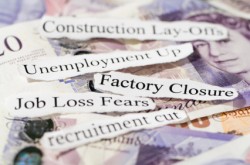 About the only ones who ever thought the troops would suck it up with vim and vigor after a layoff were the corporate suits.
About the only ones who ever thought the troops would suck it up with vim and vigor after a layoff were the corporate suits.
Now comes a study from Leadership IQ, a training and research firm, that bears out the conventional wisdom. Three-quarters of layoff survivors say their productivity has declined while customer service has worsened. The survey also found that 69 percent of the remaining workers believe the quality of the company’s products or services has declined since the layoffs.
The company’s survey of 4,172 workers who kept their jobs after a layoff also found:
- 64% of surviving workers say the productivity of their colleagues has also declined.
- 81% of surviving workers say the service that customers receive has declined.
- 77% of surviving workers say they see more errors and mistakes being made.
- 61% of surviving workers say they believe their company’s future prospects are worse.
As might be expected when surveying workers who have been through a layoff, the majority of workers said they had feelings of guilt, anger, and anxiety, perhaps explaining the decline in productivity and the finding that 87 percent were less likely to recommend their organization as a good place to work.
“There is a great myth that, following a layoff, the surviving employees will be so grateful that they still have a job that they’ll work harder and be more productive,” says Mark Murphy, chairman of Leadership IQ,. “But as this study shows, the opposite is usually true.”
What can be done to reduce the negative impacts?
The Leadership IQ survey provides some guidance. It found that workers who gave their managers high scores for visibility, approachability, and candor were 72% less likely to report a decrease in their productivity and 65% less likely to report a decline in the quality of their company’s product or service.
Murphy counsels that how a layoff is conducted is important, but the aftermath needs careful management.
“Managers need to be highly visible to their staff, approachable even when they don’t have anything new to say, and candid about the state of things in order to build their trust and credibility,” Murphy recommends. “If your company has to conduct a layoff, it is imperative that you train your managers how to both manage that process and deal with the highly debilitating aftermath. Otherwise you will waste any potential cost savings from the layoff on lost productivity, quality problems, and service breakdowns.”
“Layoffs won’t deliver real cost savings if you mismanage the layoff process,” Murphy adds. “Offering terminated employees severance packages and outplacement assistance is wonderful, but it completely misses the most important group of employees; the survivors. You have to keep the surviving employees engaged and productive, or your company won’t ever recover.”